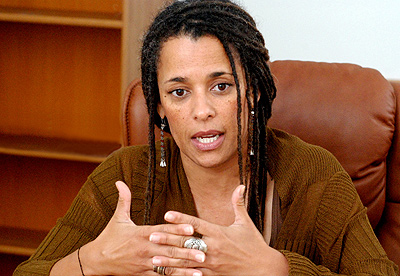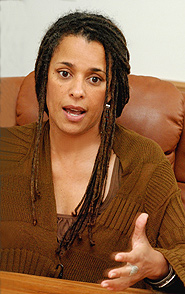Berkeleyan
 |
Carolyn Finney: Bringing blacks - including her parents - into the environmental conversation (Peg Skorpinski photos) |
Black, white, and shades of green
Exploring issues of race, land, and identity, geographer Carolyn Finney finds a place for herself in academia
![]()
| 28 November 2007
"I take a nontraditional approach to being in academia," allows Berkeley geographer Carolyn Finney, who dropped out of college in her teens and "didn't care if I ever went back." It wasn't until 1996 - by which time she'd chalked up life credits including an acting career spanning a dozen years and two coasts, a round-the-world backpacking trip, a broken marriage, and 18 months' residence in a Nepalese village - that she got around to completing her bachelor's degree.
Well into her 30s, a postbaccalaureate education wasn't part of the plan. Nor did Finney know, as she worked on her master's thesis, that she'd go on to earn a Ph.D. She certainly never expected her unconventional intellectual odyssey to lead to Berkeley, much less to yield an assistant professorship before the ink on her doctorate was dry. Even now, toward the end of her first semester in the Department of Environmental Science, Policy and Management, her barren Giannini Hall office has a feel of impermanence, as if she's not quite ready to settle into either a single place or a fixed, scripted identity.
In fact, Finney is thrilled with her latest role. Fittingly, though, it was travel that crystallized her lifelong interest in place and identity - her own, as a black woman with strong ties to the land, and those of women and people of color generally - and gave shape to the questions she explored for her doctoral dissertation, "Black Faces, White Spaces: African Americans and the Great Outdoors."
Extensive field work, interviews, and content analysis led her to conclude that the dominant representations of the environment perpetuate the idea of a "white wilderness," from which "African Americans are intentionally or unintentionally excluded." A random sample of 10 years of Outside magazine, for example, turned up a total of 4,602 photographs that included people, but just 103 showing African Americans - most of them ads featuring athletes like Michael Jordan, Carl Lewis, and Patrick Ewing in urban settings. Blacks were largely missing from a decade's worth of brochures from three national parks in Florida.
Such representations and "racialization" of space, she wrote, can result in a narrowing of black identity and discourage African American engagement with the environment, whether as visitors to national parks and forests or as employees and activists in environmental organizations. Yet the idea of nature - and the movement to protect it - as a mostly white dominion is a view that Finney, a "feminist geographer" as well as a cultural one, rejects as a matter of both scholarship and personal experience.
"People often ask me, how did you come up with this subject?" Finney says. "And part of it was academic - I'm reading stuff in classes, I'm not seeing very much at all in geography about African Americans and the environment, that interaction. And when I do it's about environmental justice, which is kind of a narrowly defined experience of the environment.
"But I'm in many ways more interested in the public conversation," she adds. "How are we having this conversation in the newspapers, on TV, who are we seeing, who are we not seeing, what are the stereotypes?"
A place of one's own
Finney's awareness of that conversation started in childhood. She grew up in the gardener's cottage on a 13-acre estate in a wealthy white neighborhood of Mamaroneck, N.Y., where her father was a combination caretaker, groundskeeper, and chauffeur, and her mother kept house. It was, she recalls, "a beautiful piece of property," with flower and vegetable gardens, a lake, and a variety of fruit trees. The owners, who were there only on weekends and holidays, lived in "what I call the big house."
"I remember being 9, and walking home from school," she says. "There were always police patrolling the neighborhood, and one day there was a new policeman on patrol. When he saw me walking home he asked, 'Where are you going?' And I said, 'Oh, around the corner,' and I gave him the address. And he said, 'Do you work there?'?"
Even in the recounting, Finney is incredulous. "I'm 9," she repeats. "I said, 'No, I live there.' And so, reflecting back, I was completely out of place."
Yet if Mamaroneck taught her what it means to be out of place, it also instilled in her an abiding sense of what it means to be of a place - to know it and care for it, as her parents did - and to have to leave after 50 years because somebody else holds the deed.
 As a child in Mamaroneck, N.Y., Finney says, "I was completely out of place." |
Finney believes the relationships between land and people - and black people in particular - tend to get edited out of America's familiar environmental story, first told by early conservationists like John Muir and echoed today by major green groups and media, of nature as a pristine, unpeopled paradise.
"The mainstream environmental movement talks about the earth, and you know, if I hear one more person say 'Save the earth' - for me, it's kind of arrogant, actually," she explains. "The earth doesn't need us to save it. What we need to understand is our relationship with the earth, and what it means to have that close connection and interaction, day to day, with a piece of land that you can call yours in some way.
"We can have a different kind of conversation where, really, none of us has any real ownership," she adds. "But when we talk about day-to-day material real life and issues of private property in this country in particular, and what it means to be able to claim a piece of land for yourself - and what it must mean if you can't claim any for yourself - I've found at least with a lot of black people that I talked to, this really played into their perceptions."
Widening the mainstream
For Finney, there's no discernible space between the scholarly and the personal. "Often, when people ask me about issues of race, and in particular the African American community, they forget that I'm also the thing itself," she says. "It's emotional for me. So if I'm going to be authentic in talking about race - and I'm most interested in being authentic - that really messes with people's heads, because they sometimes forget that I'm both the voice and the thing itself."
The voice, in fact, is that of an actress, a profession Finney practiced for 12 years or so, working in theater in New York and "a lot of commercials" in Los Angeles (spots for McDonald's, Domino's Pizza, Molson Beer, and other consumables), along with a recurring role in the fantasy-TV show Beauty and the Beast. In 1987, hoping to save her struggling marriage, she and her then-husband embarked on a backpacking trip through Africa, Egypt, Israel, and parts of Asia. She lost the marriage but gained new (and disquieting) insights into how cultural differences colored her judgments of people and practices.
"I thought I was all that," she recalls, "and found out that I wasn't."
Even as she kept up her acting career, work became a way to earn money for the next trip, until a solo journey to Africa in 1992 "changed everything." She dropped acting, moved in with her parents for four months - "I'm in my 30s," she recollects with a wince - and ended up living in Nepal for "this incredible year and a half," during which time she decided to return to school to study gender issues and international development.
She enrolled in Fairhaven College in Washington State because, she says, she was allowed to design her own bachelor's program, which included six months living on a farm in Kenya as an exchange student. Eventually she went on to Utah State University, which was her "last choice" for grad school but which offered her the most money to attend. ("I like to tell people I was diversity in Logan, Utah," she laughs.) Toward the end of her first year she wrote a paper on black feminist political ecology for a required course in geography and, perhaps, found her calling.
"I wrote it not because it was an assignment, but because I got into it," Finney says. "It's the first time I really understood that you could actually love an idea and it can become yours, you can make it yours."
She won a Fulbright as a doctoral candidate at Massachusetts' Clark University, where the idea of African Americans' ties to the environment took hold of her imagination. Despite having planned to write her dissertation on Nepal, gender, tourism, and the environment, she spent a year creating a new proposal for "Black Faces, White Spaces." She was still making a last round of revisions - and completing the first year of a postdoc teaching job at Wellesley College - when she got the job offer from Berkeley.
The project was all-consuming and enormously rewarding. "I met everybody I wanted to meet," she says, including the late black environmentalist and educator MaVynee Betsch - known as "the Beach Lady" of Florida - and Marin County's John Francis, an African American who spent 22 years walking and sailing around the world to promote the cause of sustainability. She developed a close friendship with Audrey Peterman, who founded the black-oriented environmental consulting firm Earthwise, and encountered any number of activists, authors, and artists, "this range of black people with this amazing knowledge about, experience with, and feeling for the environment that's not getting told about."
Like prevailing views of African Americans, Finney believes the mainstream definitions of environmentalism are far too narrow.
"There are people who grow urban gardens - they're not seen as environmentalists. There are people who subsistence-fish, people whose day-to-day lives are directly dependent on their relationship with the earth - my dad's not called an environmentalist, are you crazy?' she asks, her voice rising at the absurdity. "He cared for the land for 50 years, how can he not be an environmentalist? Being an environmentalist doesn't mean only that you have to camp and hike. There are plenty of ways to be involved with the environment."
There are also more than a few ways to be involved with academia, as shown by Finney's unorthodox career. "I believe everybody has some degree of agency," she says. "We don't all have the same choices, but we have some degree of agency. And I like to say that because it means that I'm not beholden to your view of the world, that I have the capacity to think differently."
And soon, when things calm down a bit, she hopes to finish decorating her office.

